INTERNACIONAL
Daylight Savings: It’s about the sunlight

It’s not about the math.
But it is about the sunlight.
«My goal is just to make sure people get more sunshine,» said Sen. Ed Markey, D-Mass.
«I am fond of saying you can’t shovel sunshine,» said Sen. Ted Cruz, R-Tex.
«The American people love having an extra hour of sunlight,» said Sen. Rick Scott, R-Fla.
‘STOP THE CLOCK’: GOP, DEMS COME TOGETHER TO END DAYLIGHT SAVING OVER HEALTH, ECONOMIC RISKS
Tax day is upon us. So millions of Americans are hoping they score a refund from the federal government.
And millions of Americans are hoping Washington can help them pocket an extra hour of daylight too.
This is why Congress is trying to maximize the sun.
President Trump recently opined «the House and Senate should push hard for more Daylight at the end of a day,» emphatically dubbing Daylight Saving Time «A VERY COSTLY EVENT!!!» (Kevin Dietsch/Getty Images)
Some lawmakers believe it’s time to «lock the clock.» Either choosing Standard Time or Daylight Saving Time. But the twice-a-year clock switching may be living on borrowed time.
That’s why the Senate Commerce Committee held the first Congressional hearing on the biannual time change for the first time in three years last week.
«We need to stop the clock. We need to find a solution and stick with it,» said Sen. Lisa Blunt Rochester, D-Del. «People across our country are tired of the constant cycle of falling back and springing forward. I mean, who hasn’t forgotten to change their clock on their microwave. I think mine is still on the wrong time.»
WE LIVE IN TIME: DAYLIGHT SAVINGS AND THE ‘TIME LORDS’ OF CONGRESS
President Trump has weighed in several times in opposition to the clock switching – both during this term in office and during his previous tenure.
In March, the President called it a «50-50 issue.» But Mr. Trump again wrinkled the time conversation with a post on Truth Social. Despite not taking a stand when the U.S. «sprang forward,» President Trump was emphatic about what should happen now.
«The House and Senate should push hard for more Daylight at the end of a day. Very popular and, most importantly, no more changing of the clocks, a big inconvenience and, for our government, A VERY COSTLY EVENT!!!,» wrote the President.
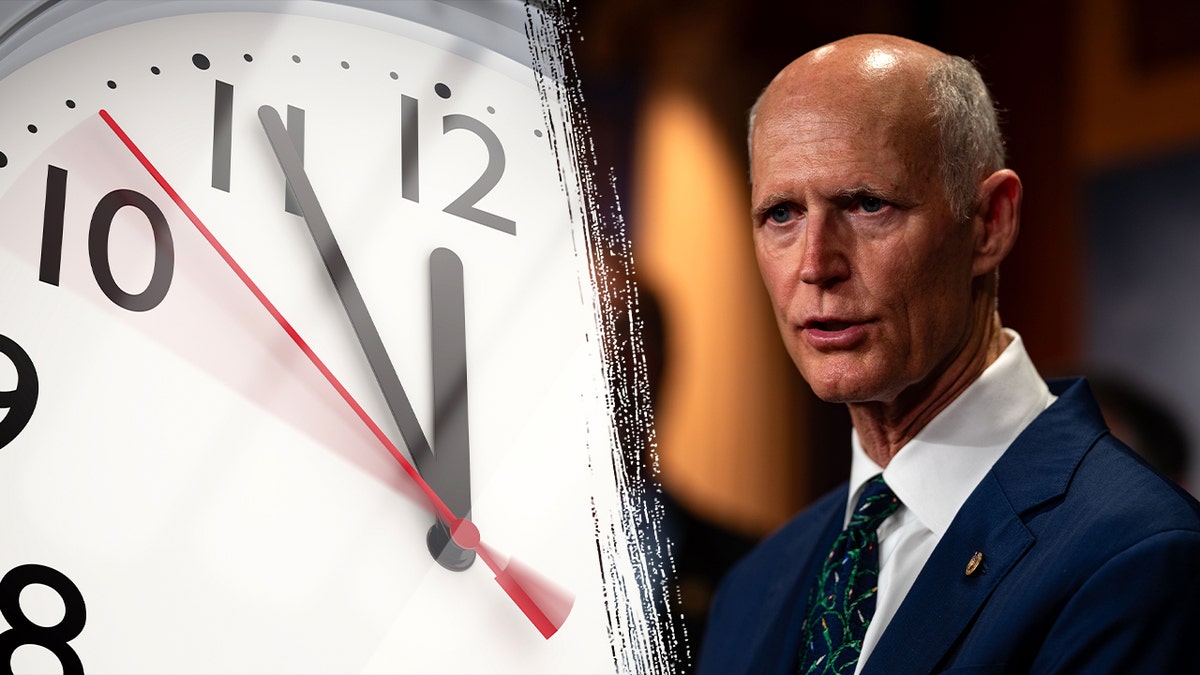
Sen. Rick Scott, R-Fla., has long been a proponent of ending the biannual clock change. (iStock | Getty Images)
Rick Scott has grappled with the time issue before. Scott served two terms as governor of Florida before entering the Senate. Scott signed a bill into law that would let the Sunshine State (go figure) opt out of the time change. A similar piece of legislation has bipartisan support on Capitol Hill.
Scott looked to the president’s lead.
«We have a great opportunity to finally get this done with President Trump on board to lock the clock,» said Scott.
But locking it an hour ahead? Or an hour behind? There’s little agreement.
TRUMP SAYS CONGRESS SHOULD PUSH ‘FOR MORE DAYLIGHT AT THE END OF A DAY’
The Senate voted to permanently park the U.S. on Daylight Saving Time in 2022. Secretary of State and then-Sen. Marco Rubio, R-Fla., surprisingly advanced a bill without objection from any senator.
«Without objection, so ordered!» exclaimed former Sen. Kyrsten Sinema, I-Ariz., who presided over the Senate that day.
«Yes!» she declared, yanking her arms toward her like a coach who’s kicker just drilled a field goal late in the game.
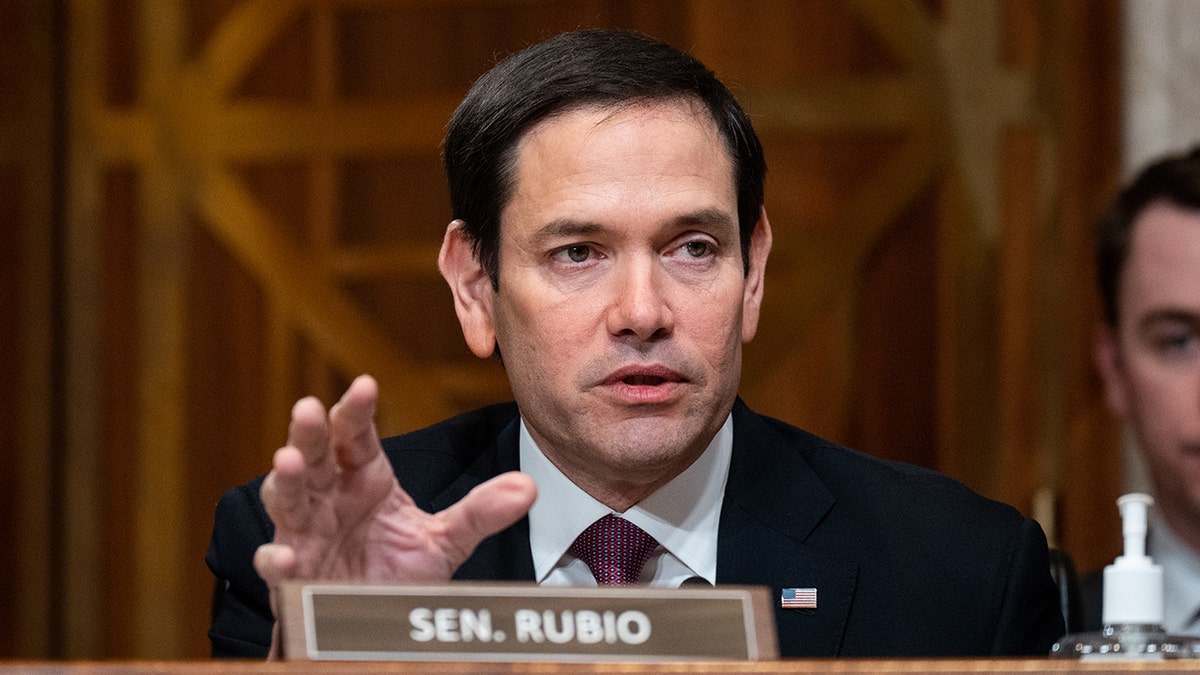
Then-Sen. Marco Rubio, R-Fla., was able to advance a bill establishing permanent Daylight Savings in 2022 without objection from his colleagues. It subsequently died in the House. (Bill Clark/CQ-Roll Call, Inc via Getty Images)
But the plan died in the House.
«The spring clock change to Daylight Saving Time is bad. But permanent Daylight Saving Time is worse,» testified Karin Johnson a Professor of Neurology at UMass Chan School of Medicine. «The later sunrises and sunsets of Daylight Saving Time lead to higher risks of chronic diseases, including but not limited to cancer, diabetes, heart disease, obesity, and these outweigh the short term risks of what happens with the time change.»
Johnson also told senators that «year-round Standard Time is a natural, healthy choice promoting physical health, mental health performance and safety.»
CONGRESS DEBATES FUTURE OF DAYLIGHT SAVING TIME
Johnson argued that the U.S. should not «pick something that’s been tried and failed twice before.»
Johnson’s right. The U.S. has «sprung» forward to Daylight Saving Time – or its equivalent – on two separate occasions. In 1918, Congress voted for the nation to embrace Daylight Saving Time to conserve energy during World War I. Farmers pushed a repeal of Daylight Saving Time. So Congress undid it. President Woodrow Wilson vetoed the bill. But Congress overrode him. It’s one of only 112 successful presidential veto overrides by Congress in the history of the republic.
Lawmakers greenlighted the Emergency Daylight Saving Time Energy Conservation Act – triggering year-round Daylight Saving Time – in the mid 1970s. This was in response to the OPEC oil shocks. The nation was supposed to remain on Daylight Saving Time for two years. But the new time proved so unpopular that lawmakers unwound the clocks to Standard Time after only a few months.
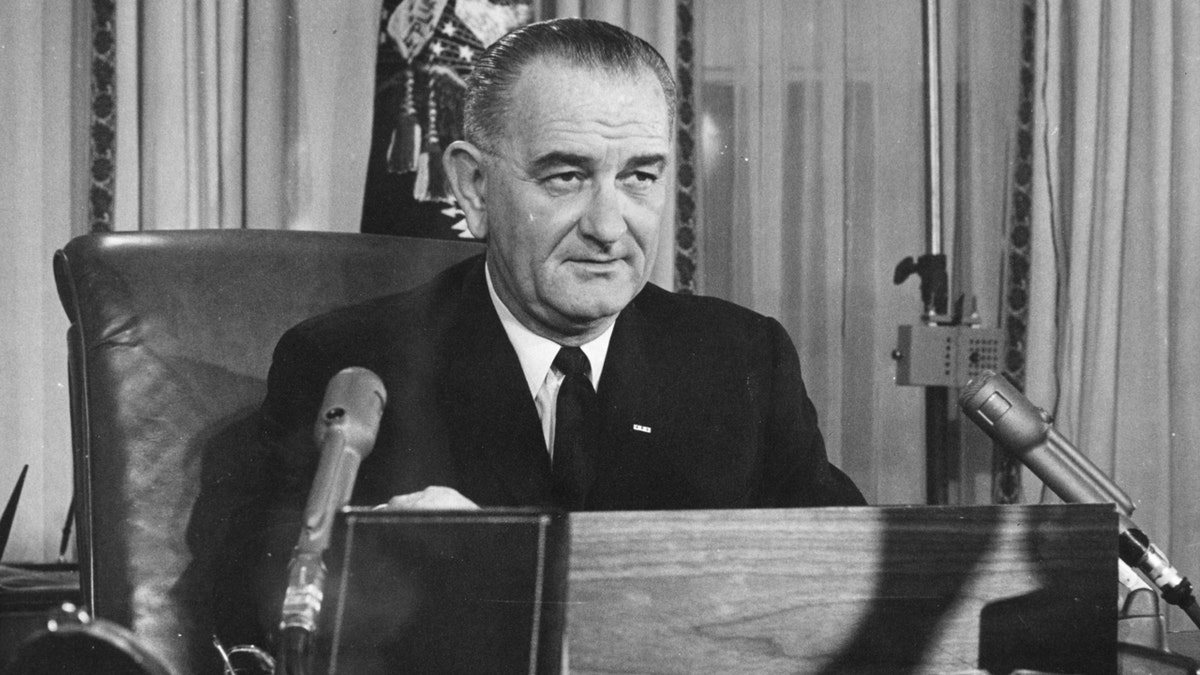
Daylight Saving Time, in its current form, first became law during the Johnson administration. (Keystone/Getty Images)
However, permanent Daylight Saving Time has its advocates.
Jay Karen of the National Golf Course Owners Association told senators that shifting the clocks an hour ahead would prompt an extra 27 million rounds of golf on the links each year. Karen estimated that golf course owners would pocket an additional $1 billion.
«Americans overwhelmingly prefer evening recreation over early morning,» testified Karen.
But do you know who absolutely hates Daylight Saving Time?
Convicts!
A University of Washington study found that the single toughest sentencing day of the year is the Monday after we spring forward each March.
Blame it on cranky judges who lost an hour of sleep.
DAYLIGHT SAVING TIME: THERE OUGHTA BE A LAW
«Some people receive harsher sentences than they otherwise would,» said Scott Yates of the Lock the Clock Movement.
Justice may be blind. But it can certainly tell time.
Arizona and Hawaii don’t observe Daylight Saving Time.
Sen. Todd Young, R-Ind., is leery of a nationwide fix. Two time zones cleave the Hoosier State.
«We have 12 counties in the western part of the state that are in the Central Time Zone,» said Young. «Maybe a one-size-fits-all national policy on time changes doesn’t take into account the regional differences that significantly impact daily life.»
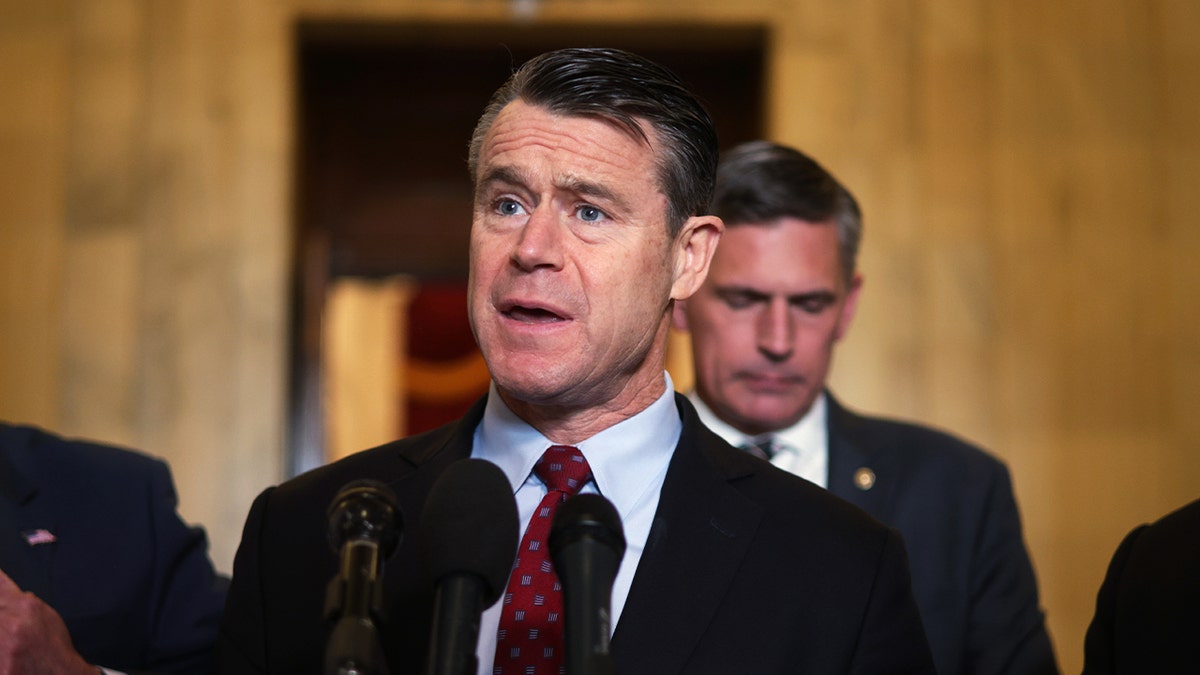
Sen. Todd Young, R-Ind., represents a state that straddles two time zones. He’s naturally skeptical of a one-size-fits-all approach to the Daylight Savings issue. (Alex Wong)
It all hinges on location. Some people in the north and east will benefit for some of the year. But the sun will come up too early in the summer and set too early in the winter. Residents on the western ends of time zones seem to get more sunlight later in the year as well. But other locales? Not so much.
«Hello darkness, my old friend,» mused Cruz, channeling Simon & Garfunkel.
During the hearing, Cruz commented to a witness that «your time has expired.»
And that may be the case with the time change. But not unless Congress can agree what to do.
Even the name of the March time switch is contrived. It’s classic Washington spin. «Daylight Saving.» Lawmakers are essentially trying to convince the public they’re getting more of something – for free. But they’re not.
CLICK HERE TO GET THE FOX NEWS APP
There are only so many hours and minutes of sunlight in the day. Period. It’s always going to get too dark too early somewhere. And the sun will always come up too early somewhere. And even though Congress has a lot of clout, it certainly can’t control that.
Congress,Senate,Donald Trump
INTERNACIONAL
Punto por Punto: en qué consiste el plan de Trump para poner fin a la guerra en Gaza
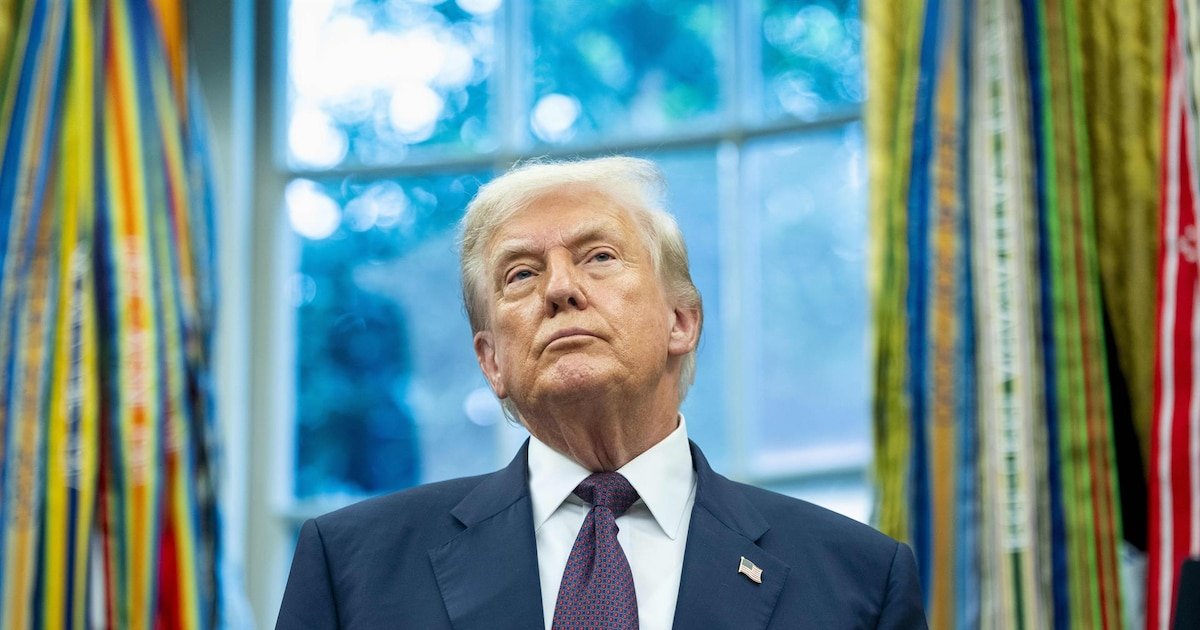
El presidente de Estados Unidos, Donald Trump, anunció que Israel y el grupo terrorista Hamas llegaron a un acuerdo para un intercambio de rehenes por prisioneros, en el marco de la primera fase de un plan global para la finalización de la guerra en Gaza.
El plan, estructurado en 20 puntos, establece los pasos a seguir en la zona de Medio Oriente. El primer punto del esquema establece que Gaza debe convertirse en “una zona desradicalizada y libre de terrorismo para que no represente una amenaza para sus vecinos”. La segunda cláusula agrega que el enclave “será reconstruido para beneficio de su población, que ha sufrido más que suficiente”.
El tercer apartado fija la condición de que, si ambas partes aceptan, “la guerra terminará inmediatamente”. Israel deberá retirarse a la línea acordada para preparar la liberación de los cautivos, mientras se congelan las operaciones militares. El cuarto punto impone un plazo estricto: “Dentro de las 72 horas de que Israel acepte públicamente este acuerdo, todos los rehenes, vivos y muertos, serán devueltos”.

El quinto punto establece el componente recíproco: tras la liberación de los rehenes, Israel pondrá en libertad a “250 prisioneros condenados a cadena perpetua, además de 1.700 gazatíes detenidos después del 7 de octubre de 2023, incluidas todas las mujeres y niños”.
También se estipula que, por cada rehén fallecido que se devuelva, Israel entregará “los restos de 15 gazatíes”.
El sexto punto aborda el tratamiento de los combatientes de Hamas. Quienes se comprometan a la “coexistencia pacífica y a entregar sus armas” recibirán amnistía, y quienes deseen salir de Gaza contarán con un pasaje seguro hacia otros países.
El séptimo compromiso abre la puerta a la asistencia humanitaria: “Al aceptarse este acuerdo, la ayuda ingresará inmediatamente en Gaza”, con volúmenes mínimos iguales a los pactados en el acuerdo del 19 de enero de 2025, incluyendo reparación de infraestructuras esenciales.
Según el octavo apartado, la distribución de esa ayuda quedará en manos de la ONU, la Cruz Roja y otras instituciones neutrales. El cruce de Rafah se abrirá en ambas direcciones bajo el mismo mecanismo del acuerdo de enero.
El noveno punto crea un gobierno provisional: Gaza quedará bajo la administración de un “comité tecnocrático palestino, apolítico, con supervisión internacional de una ´Junta de Paz´, encabezado por Donald Trump y figuras como Tony Blair”, encargado de la financiación de la reconstrucción hasta que la Autoridad Palestina pueda asumir el control.
El décimo punto introduce un “plan económico de Trump para reconstruir y revitalizar Gaza”, a cargo de expertos en desarrollo urbano del Medio Oriente. El undécimo crea una “zona económica especial con tarifas preferenciales y acceso negociado con países participantes”. El duodécimo apartado garantiza que “nadie será forzado a salir de Gaza”, aunque quienes deseen emigrar pueden hacerlo con derecho de retorno.
El punto trece excluye al grupo terrorista Hamas del futuro político del enclave: “Hamas y otras facciones acuerdan no tener ningún papel en el gobierno de Gaza, directa o indirectamente”. Todo el arsenal militar será destruido bajo supervisión internacional, con un programa de recompra de armas y reintegración financiado por donantes externos. El decimocuarto punto asegura la participación de actores regionales en la vigilancia del cumplimiento de las obligaciones para garantizar que “la nueva Gaza no represente una amenaza”.

El decimoquinto establece una Fuerza Internacional de Estabilización, que “se desplegará de inmediato en Gaza” para entrenar a la policía local y cooperar con Egipto e Israel en el control fronterizo. El decimosexto compromete a Israel a no ocupar ni anexar el territorio, con una retirada progresiva en función de la desmilitarización, conservando solo un perímetro de seguridad transitorio.
El decimoséptimo apartado prevé medidas de ayuda y reconstrucción en zonas “libres de terrorismo” bajo control internacional en caso de que Hamas dilate o rechace el plan.
El decimoctavo punto impulsa “un proceso de diálogo interreligioso basado en la tolerancia y la coexistencia”. El decimonoveno sugiere que “al avanzar la reconstrucción y cumplirse el programa de reforma de la Autoridad Palestina”, podrían darse condiciones para avanzar hacia “la autodeterminación y el Estado palestino”.
El vigésimo y último punto establece que Estados Unidos “abrirá un diálogo entre Israel y los palestinos para acordar un horizonte político de coexistencia pacífica y próspera”.
(Con información de AFP y EFE)
Domestic,Politics,North America,Government / Politics
INTERNACIONAL
A dizzying ride on the Hill: Lawmakers debate in circles as shutdown enters week two
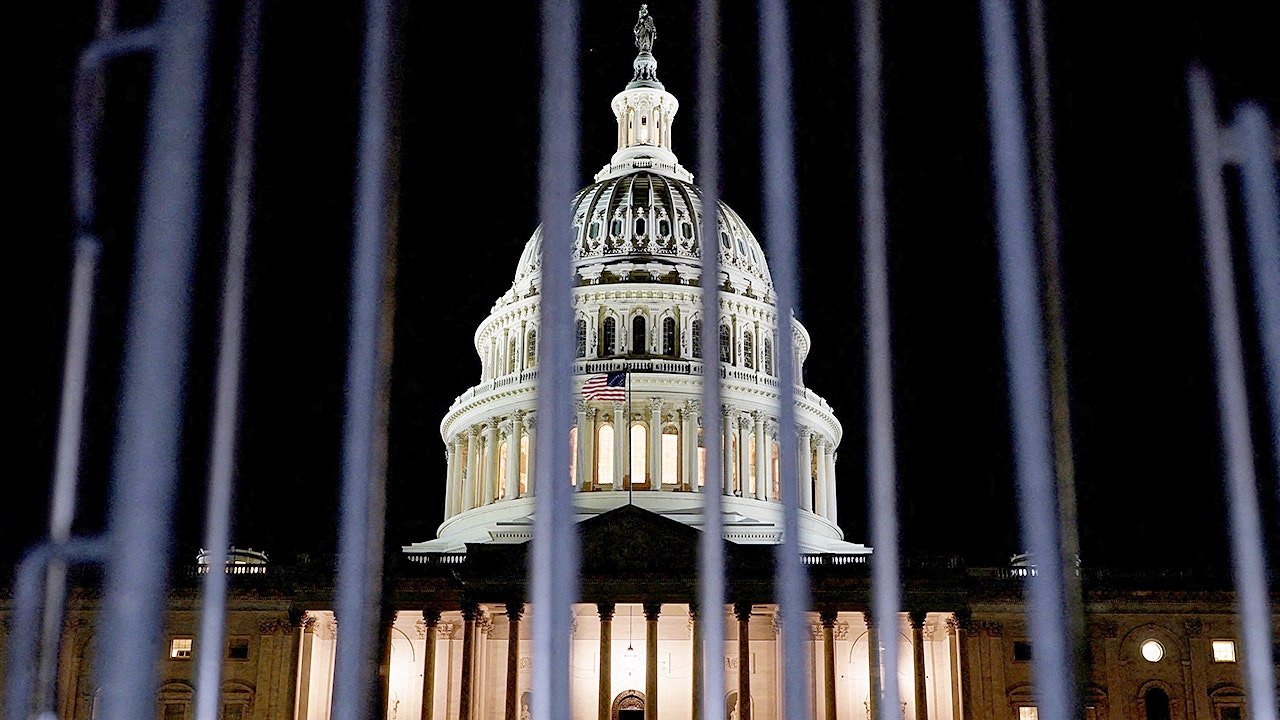
NEWYou can now listen to Fox News articles!
It must be something about October and two-year intervals in Congress.
Congress was paralyzed for more than three weeks without a leader two years ago this October as the House unceremoniously ousted former Speaker Kevin McCarthy, R-Calif.
And Congress is paralyzed again this October – unable to find the votes to re-open the government.
«There’s nothing for us to negotiate,» said House Speaker Mike Johnson, R-La. «We did the job to keep the government open. And now it’s on the Senate Democrats.»
OMINOUS RED AND ORANGE SKIES HAD CAPITOL HILL TAKE NOTICE AS SHUTDOWN LOOMED
But Democrats say that’s the problem. There haven’t been negotiations. Save for a brief White House meeting last week between President Trump and the top four bipartisan, bicameral Congressional leaders a day before the shutdown.
«The Majority Leader in the Senate, John Thune, R-S.D., talks about, ‘we’ll have conversations.’ We need more than conversations. We need a real negotiation,» said Sen. Mark Kelly, D-Ariz., on Fox.
So there are no talks. And the sides are seemingly talking past each other.
It seems as though Congress is positively heading nowhere as shutdown negotiations drag on. (Elizabeth Frantz/Reuters)
So, they’ve turned to handicapping.
Sen. John Kennedy, R-La., gamed out that the shutdown would run another week.
«It won’t end until everybody in the Senate takes their ego out back and shoots it. And then it’ll end,» predicted Kennedy.
It always is, and always will be about the math.
Senate Republicans can conjure up the votes of 55 senators to break a filibuster on the House-passed bill to fund the government. But they need 60 yeas. And Republicans are determined to stick to their playbook.
«I can tell you there’s more than five Democrats in the Senate who know that (Senate Minority Leader) Chuck Schumer, D-N.Y. has led them into a box canyon with this Schumer shutdown,» said Sen. Tom Cotton, R-Ark., on Fox. «But the consequences will start to pile up.»
REPORTER’S NOTEBOOK: SENATE REVOTES TODAY ON ENDING GOVERNMENT SHUTDOWN
White House spokeswoman Karoline Leavitt wouldn’t directly answer a question about what would trigger federal firings. But Leavitt made clear that jobs hung in the balance.
«We don’t want to see people laid off. But unfortunately, if this shutdown continues, layoffs are going to be an unfortunate consequence of that,» said Leavitt.
Democrats excoriated the Trump Administration for hinting it would cut programs and jobs in agencies important to Democrats.
«Americans really hate bullies. And this kind of bullying from the White House is going to backlash because they understand that an authoritarian president uses grants to New York for infrastructure, laying off workers, deliberately inflicting pain,» predicted Sen. Richard Blumenthal, D-Conn. «Don’t inflict unnecessary pain and then boast about it.»
Some Republicans practically reveled in the White House approach.
«All’s fair in love and war. I think that there’s a price to pay for the Democrats shutting this down,» said Sen. Roger Marshall, R-Kan. «These will be part of the consequences.»
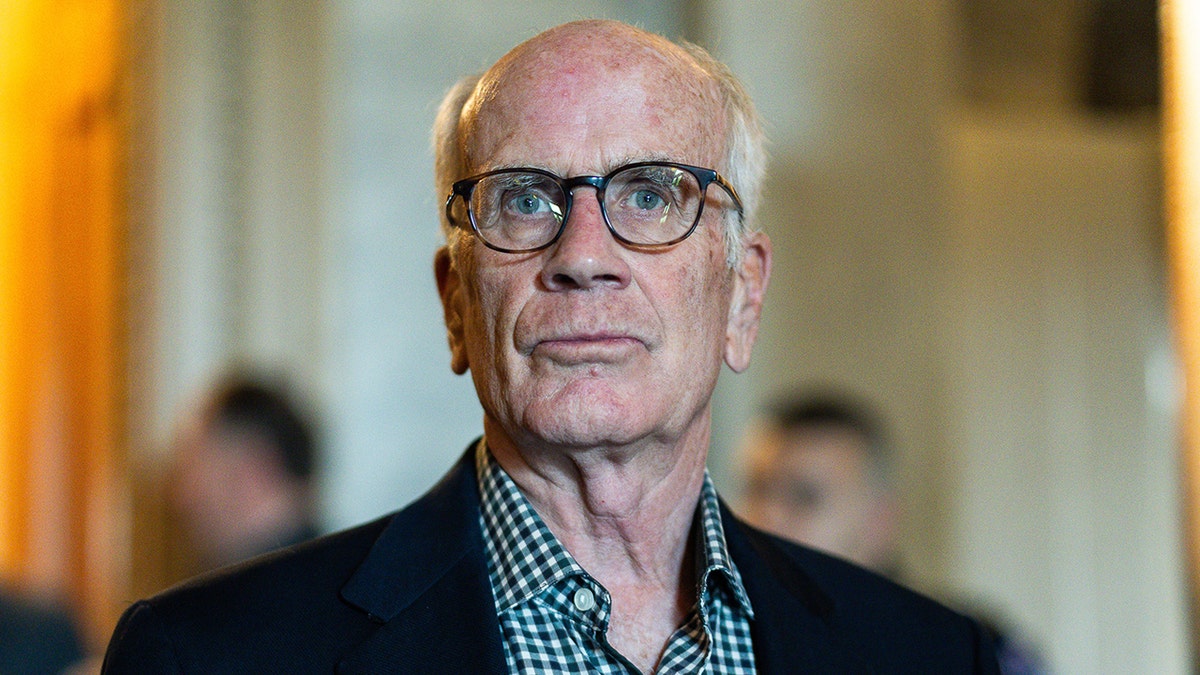
Sen. Peter Welch, D-Vt., argued that the shutdown is «collective punishment» and undercuts Republicans equally harshly. (Tierney L. Cross/Getty Images)
But one Democrat argued that the Trump administration’s gambit would also undercut Republicans and voters who supported the president. Even in blue states.
«There’s a lot of folks in Vermont, there’s lot of folk in Illinois who voted for President Trump. So this sort of collective punishment,» said Sen. Peter Welch, D-Vt., on Fox. «I think it’s a really bad idea.»
But the president is coy about when the shutdown could trigger federal layoffs.
«It could,» said the president. «At some point it will.»
Transportation Secretary Sean Duffy noted that his department saw «a slight uptick» in aviation safety employees who were calling out sick during the shutdown – since they weren’t being paid.
«They’re thinking about how am I going to get a paycheck? How do I make a car payment,» said Duffy.
WHITE HOUSE ESCALATES SHUTDOWN CONSEQUENCES AS DEMOCRATS SHOW NO SIGNS OF BUDGING: ‘KAMIKAZE ATTACK’
But if you squint, you can see a few signs of bipartisanship.
Johnson is discussing Obamacare subsidies with one prominent Democrat.
«I had I think a fruitful discussion, with Sen. Patty Murray, D-Wash., about two days ago, a day or so ago,» said Johnson on efforts to address looming Obamacare premium spikes. «Whatever the conference committee comes up with, I will put on the floor. I’m ready to go.»
But Schumer is skeptical about the Speaker’s promises.
«Delay has always been Speaker Johnson’s MO. Speaker Johnson has survived by kicking the can down the road,» said Schumer. «When Johnson says later, they know he means never.»
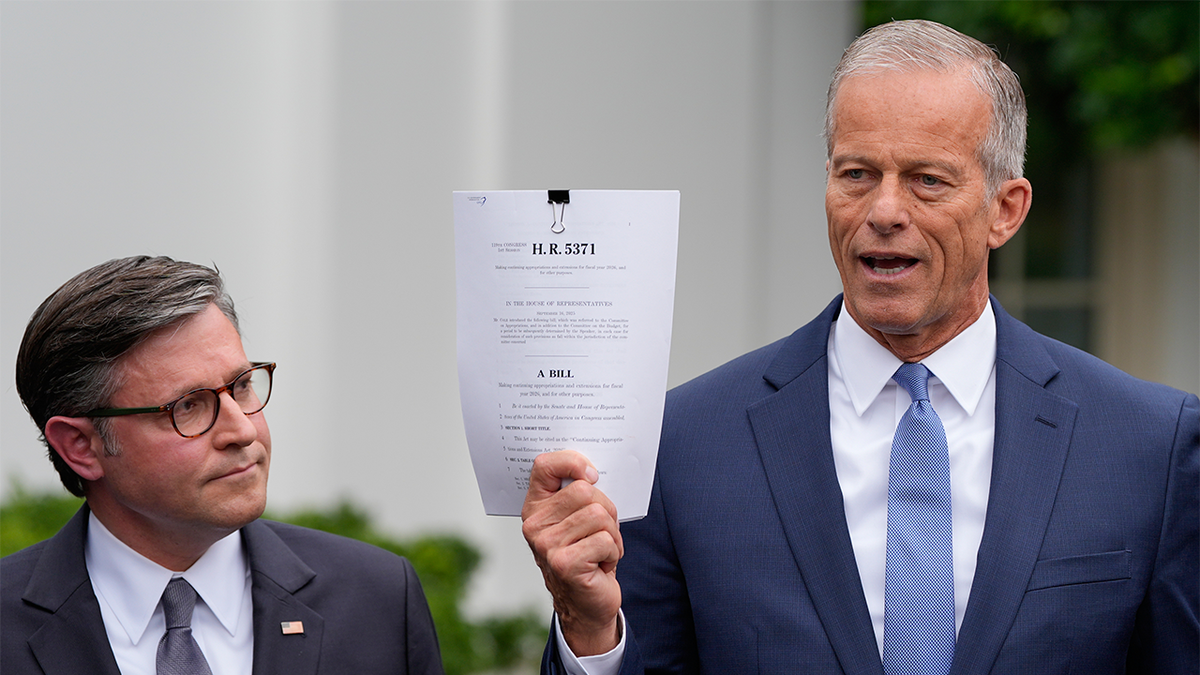
Senate Majority Leader John Thune, R-S.D., insists Democrats are «playing a losing game.» (Alex Brandon/AP Photo)
Tension is building as the shutdown barrels into its second week as lawmakers spin in circles.
«I realize that my Democrat colleagues are facing pressure from members of their far left base. But they’re playing a losing game here,» said Thune.
But each side is now engaged in a game of parliamentary chicken. Republicans won’t budge from their demand that Senate Democrats approve their funding plan. And Democrats won’t relent from their insistence that the sides shore up Obamacare subsidies.
«I’m not going to vote to reopen the government until I see a way that we can do that,» said Sen. Chris Coons, D-Del.
Even some Republicans worry about Obamacare price spikes.
«There are some folks in what is the new part of the Republican Party, which is blue-collar workers,» said Rep. Jeff Van Drew, R-N.J., on Fox Business. «We have to be careful how we do this. We just shouldn’t cut it. We should make sure we use a scalpel and not a sledgehammer.»
SHUTDOWN IGNITES STRATEGIST DEBATE: WILL TRUMP AND GOP PAY THE POLITICAL PRICE IN 2026?
But even if bipartisan senators were to forge a deal, the plan may slam into a brick wall in the House.
«Republicans have spent most of their careers being against Obamacare. Why would they expand it and add a subsidy on top of a subsidy?» asked House Appropriations Committee Chairman Tom Cole, R-Okla.
A debate is now raging over which side will cave. Or which party faces political consequences.
Naturally, Republicans believe Democrats will pay a price.
«Their radical base just wants to see them up here fighting Donald Trump, not over any particular issues,» said House Majority Leader Steve Scalise, R-La.
But Democrats don’t see a political downside.
«Are you concerned in any way about the political ramifications that voters might blame your side down the road?» yours truly asked House Minority Leader Hakeem Jeffries, D-N.Y.
«The American people are crystal clear on who shut down the government. Crystal clear,» replied Jeffries.
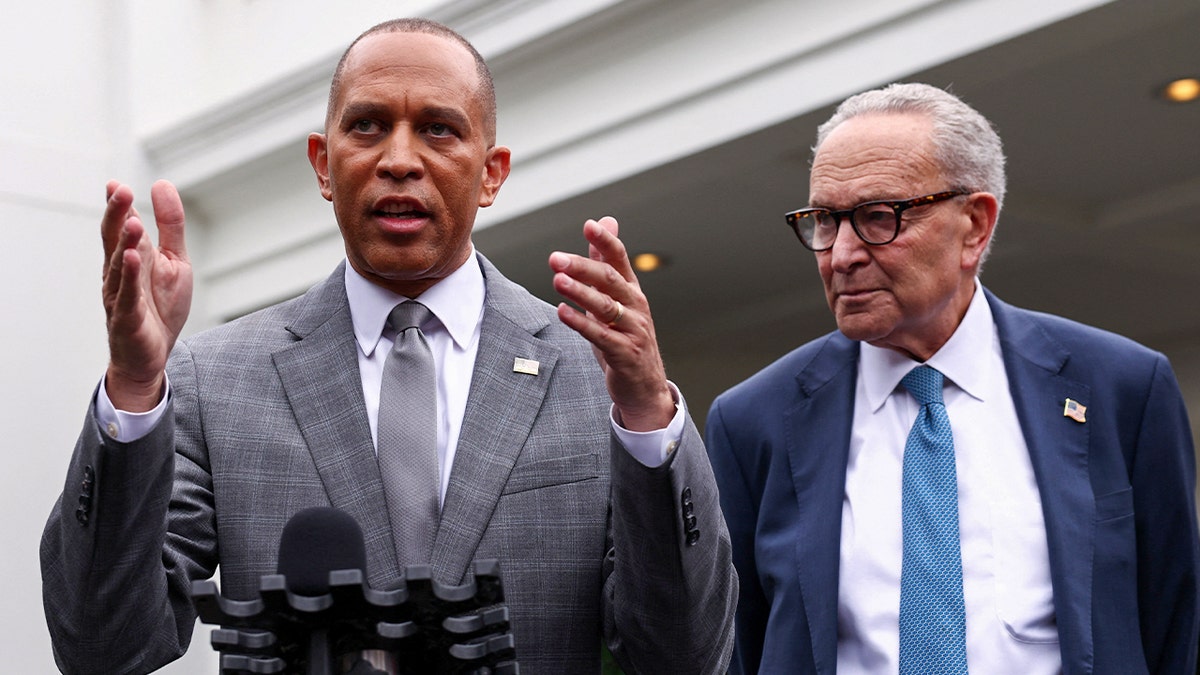
House Minority Leader Hakeem Jeffries, D-N.Y., suggested Americans are «crystal clear» on who shoulders the blame for the shutdown. (Kevin Lamarque/Reuters)
However, some lawmakers doubt that voters care about who «shut down the government.»
«My constituents don’t care about the finger pointing. They just want us to govern,» said Rep. Madeleine Dean, D-Pa.
As the impasse deepens, the Senate shifted from parliamentary posturing to ecumenical intercession.
«On this third day of the government shutdown, inspire them to work for your glory in all they think, say, and sow,» prayed Senate Chaplain Barry Black during his invocation of the Senate last week.
HERE’S WHAT TRUMP WANTS TO DO TO RESHAPE THE FEDERAL GOVERNMENT DURING THE SHUTDOWN
And then there are the sideshows. The White House sent out a meme portraying Budget Director Russ Vought as the Grim Reaper. And the president trolled Jeffries with an AI-generated social media video, casting Jeffries in a sombrero and a mustache with mariachi music playing in the background.
At the same time, Republicans warned about grave shutdown consequences.
«Real pain is being endured by real people,» said Johnson.
But in the next breath, the Speaker defended the president making light of circumstances, describing the trolling as «entertainment.»
«That’s what President Trump does. And people are having fun with this,» said Johnson.
I didn’t let that go.
«On one hand, you say this is very serious. That people have jobs on the line. On the other hand, you say, ‘oh, this is just fun and games and they’re trolling.’ Which is it?» I inquired.
«What they’re trying to have fun with, trying to make light of, is to point out the absurdity of the Democrats’ position,» answered Johnson.
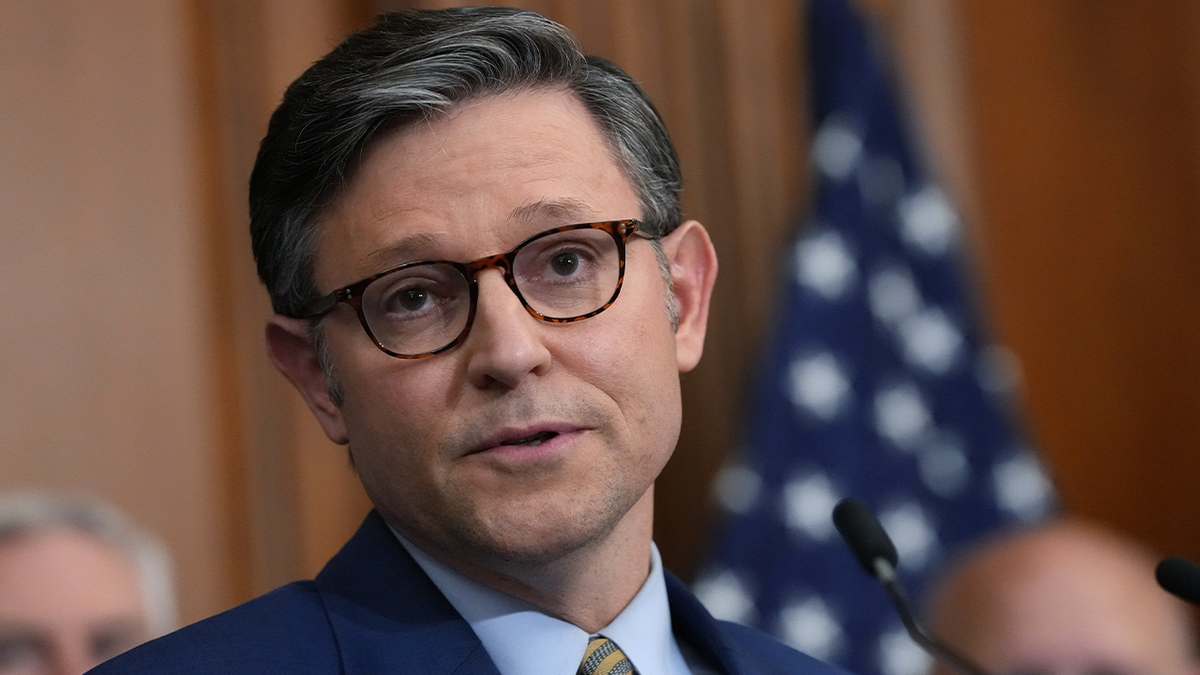
House Speaker Mike Johnson, R-La., defended President Trump’s making light of current circumstances as «entertainment.» (Kevin Dietsch/Getty Images)
So we don’t know if or when Vought will drop the anvil on federal workers. But one senator who caucuses with the Democrats and voted for the GOP plan, signaled his support could wane if Republicans overplay their hand.
«If they start firing thousands of people or clawing back other kinds of programs, I think, it could hurt their chances of getting this resolved,» said Sen. Angus King, I-Maine.’
The Senate has now blocked the House-approved spending package on six separate occasions. The sides are having casual conversations. But nothing has happened.
CLICK HERE TO GET THE FOX NEWS APP
It’s as though Congress is on a merry-go-round to nowhere, just going around and around. Everyone’s getting dizzy. And just wants to dismount.
congress,government shutdown,house of representatives politics,senate,white house
INTERNACIONAL
Europa, entre la guerra de Ucrania, el acoso ruso y la crisis política en Francia, que amenaza al euro

Francia, un caso sistémico
Júpiter se esfumó
¿Y ucrania?

 CHIMENTOS3 días ago
CHIMENTOS3 días agoMica Viciconte confesó por qué no fue a conocer a su primer sobrino: “Me cuesta, no me hallo”

 POLITICA3 días ago
POLITICA3 días agoEn la antesala de la elección de la CGT, los gremios del transporte refuerzan su conducción y su perfil opositor a Milei

 CHIMENTOS2 días ago
CHIMENTOS2 días agoQuién es la Gran Hermano que se separó y se puso de novia con un futbolista argentino: «Catalina Gorostidi está con Germán Ferreyra»
























